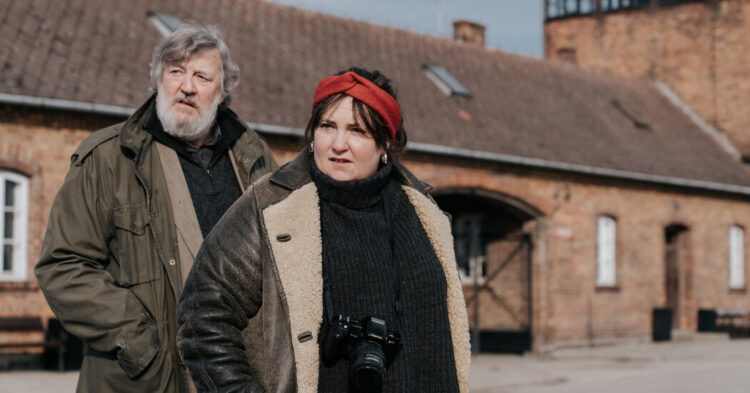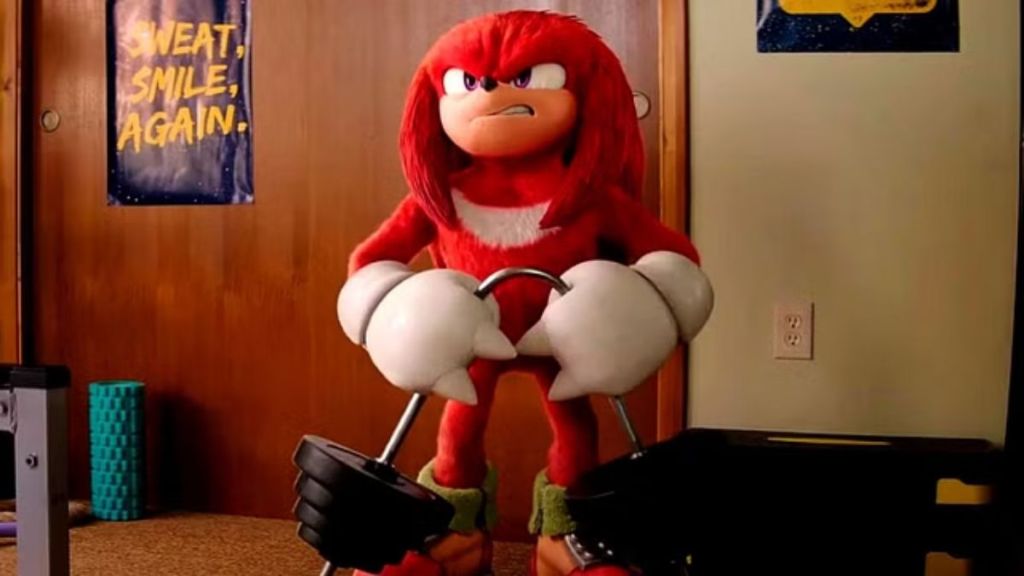Ten minutes speaking to two subjects with whom you could easily spend an hour each is somewhat like fighting with one arm behind your back. But having interviewed Lena Dunham at length and admired Stephen Fry in a multitude of fields for years, the opportunity was too fine to pass on. It helps that they’re promoting Treasure, a strong feature on which Dunham serves as producer and star but, crucially, not writer or director; those duties fall to Julia von Heinz, who’s adapted Lily Brett’s Too Many Men into an alternately amiable and bracing vision of Holocaust survivors, their children, and the various oddities and indignities that come with extended time in Poland.
In advance of the film’s opening this Friday, I spoke to both via Zoom, Fry and Dunham calling from separate locations.
The Film Stage: Good afternoon––for me. I don’t know where you’re all calling from.
Stephen Fry: New York.
Lena Dunham: He’s in New York; I’m in England. So we’ve done a little switcheroo. Classic keeping-you-on-your-toes, Nick.
Fry: And where are you, Nick?
Brooklyn.
Fry: Oh, fine. Just over the river. That’s good.
Dunham: Perfect.
Sometimes known as Girls Land.
[Both laugh]
Fry: Exactly.
Dunham: Sometimes known as the place where I impeded your parking for years on end, and I apologize.
Not a worry. And good speaking to you both, because I watched the film this weekend and liked it––a relief, since I agreed to this interview before seeing it.
Dunham: Okay, that’s really good to hear. Because I could imagine otherwise you might be trying to find a lot of workarounds.
Scrambling. Telling you I “really liked the music.”
Dunham: Just so you know: it takes a dummy to fall for that, Nick.
[Fry laughs]
Dunham: Because we liked the music, too. But let’s face it: it’s not the first compliment that’s coming. Sorry to the composers.
Lena, this is a production from your company, Good Thing Going. And I’m wondering how the notes and feedback you give as a producer are unique from what you’d offer as the showrunner of a series or director of actors.
Dunham: I was really, really lucky to be produced by some amazing people when I started out. Judd Apatow, Jenni Konner––people who pushed me in really great directions while also really, deeply supporting my voice––and I have been lucky enough to work with a number of amazing producers. I made another film with the amazing people at FilmNation. I continue to work with Working Title here in the UK. I have the best examples of what producers can be. And I think what that is is somebody who understands and recognizes the film the filmmaker wants to make, gets onboard with that movie, and tries to help surround them with the people who can give them the most, and tries to give them notes that encourage it to be the best version of itself. Not to be the Lena Dunham version of itself; not to be the version that I would write; not to be the version that I think one of my filmmaking luminaries would write; but the version that Julia von Heinz, the writer and director that I think is so brilliantly talented, would make.
So when I’m writing and directing a series, I love to collaborate. But at the end of the day, the specificity can be a little outlandish. And I have a deep understanding of what needs to be done and how it needs to be done. I guess, at Good Thing Going, with my producing partner Michael [P. Cohen], my biggest question was: how do I give Julia everything she needs to tell me the story that she has told me has been inside her for ten years? At the end of the day my greatest hope is that she walks away saying, “I made the movie that I was meant to make.” That is something that, at the end of the day, doesn’t have to do with reviews, doesn’t have to do with box office. The only thing it has to do with is knowing you told the best version of the story that was inside you. So I guess it was a long-winded way of saying it. But I tried to get in and get out with as little chaos as possible. And as an actor I just tried to go, “Tell me what you need from me. How am I here to serve?”
Fry: I was going to say: just purely, as an actor, Lena never gave off producer vibes when she was with me. We were fellow actors together making together. There was never a sense of “my film.” Always she was so generous to me and to Julia because she knew how to be an actor. Sometimes you work with stars who have a production behind it; it’s only a basic EP credit and they sort of lord it over the production. [Laughs] That’s not Lena’s style.
A couple years ago we talked about Sharp Stick.
Dunham: I remember talking about it, and that interview was very meaningful to me. You asked amazing questions.
Oh. Thanks.
Dunham: That was such a labor love and I will remain grateful to you. Don’t think I forgot.
Well, I appreciate that. And therein we discussed the importance of production design to your work. I thought about that here, in that the locations were very compelling. Having spent a lot of time in Poland, I can say this film is unnervingly accurate about the experience of traveling there: being exhausted in the car from the airport, looking out at the old towns; walking through them, how cold and overcast it often is; the sleepless nights in hotel rooms, of which I’ve had many. I’m wondering about the practical advantages of being on locations, as an actor.
Fry: Very interesting. There’s a kind of historical joke about the filming, in that we spent eight days in Poland. Not much more filming. Because Poland has become the great success story of Europe, in terms of prosperity. And the grim Marxist architecture and affect of the country is quite hard to find. Julia did a great job, in the bits that needed to be Lodz or Krakow––or, as you say, the roads in-between––but the great joke is: to find the great misery of Marxist architecture [Laughs] and town-planning, you need to go to East Germany. So most of our filming was Berlin, Halle––places like that. But again: it’s the marvelous feeling about what production design does. Wherever your eye falls, you get used to blanking-out the lamps and cameras and believe yourself to be in that position. Like when we talked through the reception of that Communist-era hotel. It just felt like we were back in time.
Dunham: The fact that you’ve had that experience and know what that is… I mean, the amount of texts that I sent at odd hours from Polish hotel rooms, the amount of strange comfort television from the ‘90s that I rewatched. There was a dark night where I couldn’t find any food and I ate somebody’s Pizza Hut from outside their door. I promised I would never tell that again, but it did happen in a hotel and I did tell Stephen and I’m ashamed. But it was like: this alternate world that is both unstuck in time and unbelievably specific.
Something amazing Julia did is, at our first table read, she had sat down and––before we’d even begun prep––she showed us a photograph of every single location in the movie. The locations were characters to her. She spent years finding them. The ones she couldn’t find she created through a combination of greenscreen and builds. There was an exacting nature to the places that she wanted to put the characters. You’re right: that’s something that made me go, “I would follow this person anywhere.” Because that level of detail to the person and the surroundings is sort of my cinematic love language.
Lena, it’s been a couple years since you heard about it, but I promise: Fellas is coming.
Dunham: If you don’t think that I remember Fellas and am counting my minutes… and by the way: I will watch the shit out of Fellas. I will tweet about Fellas. Bring us Fellas.
[Fry laughs]
Thank you. The wheels are in motion.
Dunham: Even if it’s just webisodes. Just get us started.
Or an anthology feature.
Dunham: That’s what I want! That’s what I want. To be both an anthology and play at Anthology.
Treasure opens on Friday, June 14.
The post Lena Dunham and Stephen Fry on Treasure, a Producer’s Dream, and Capturing Poland first appeared on The Film Stage.





